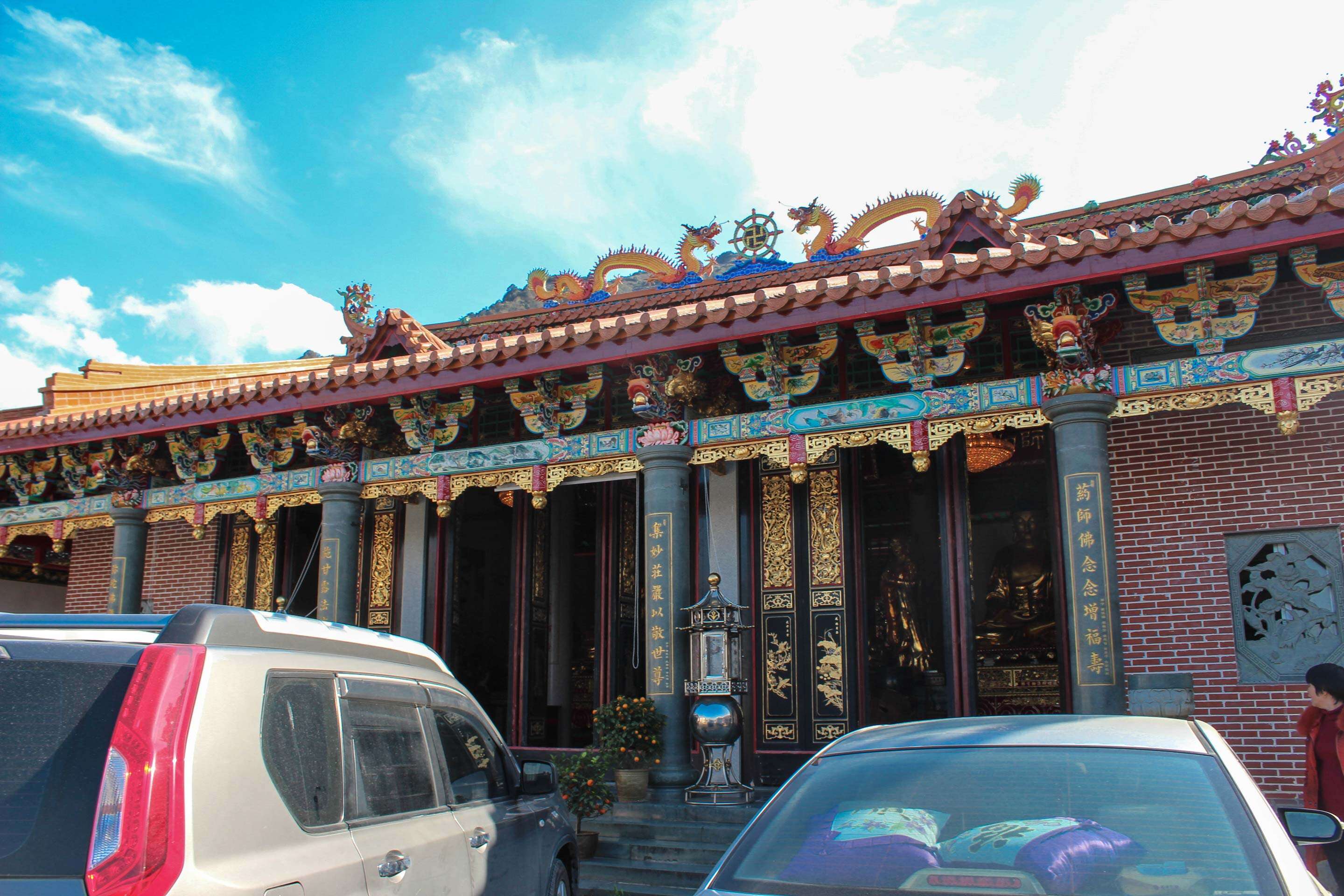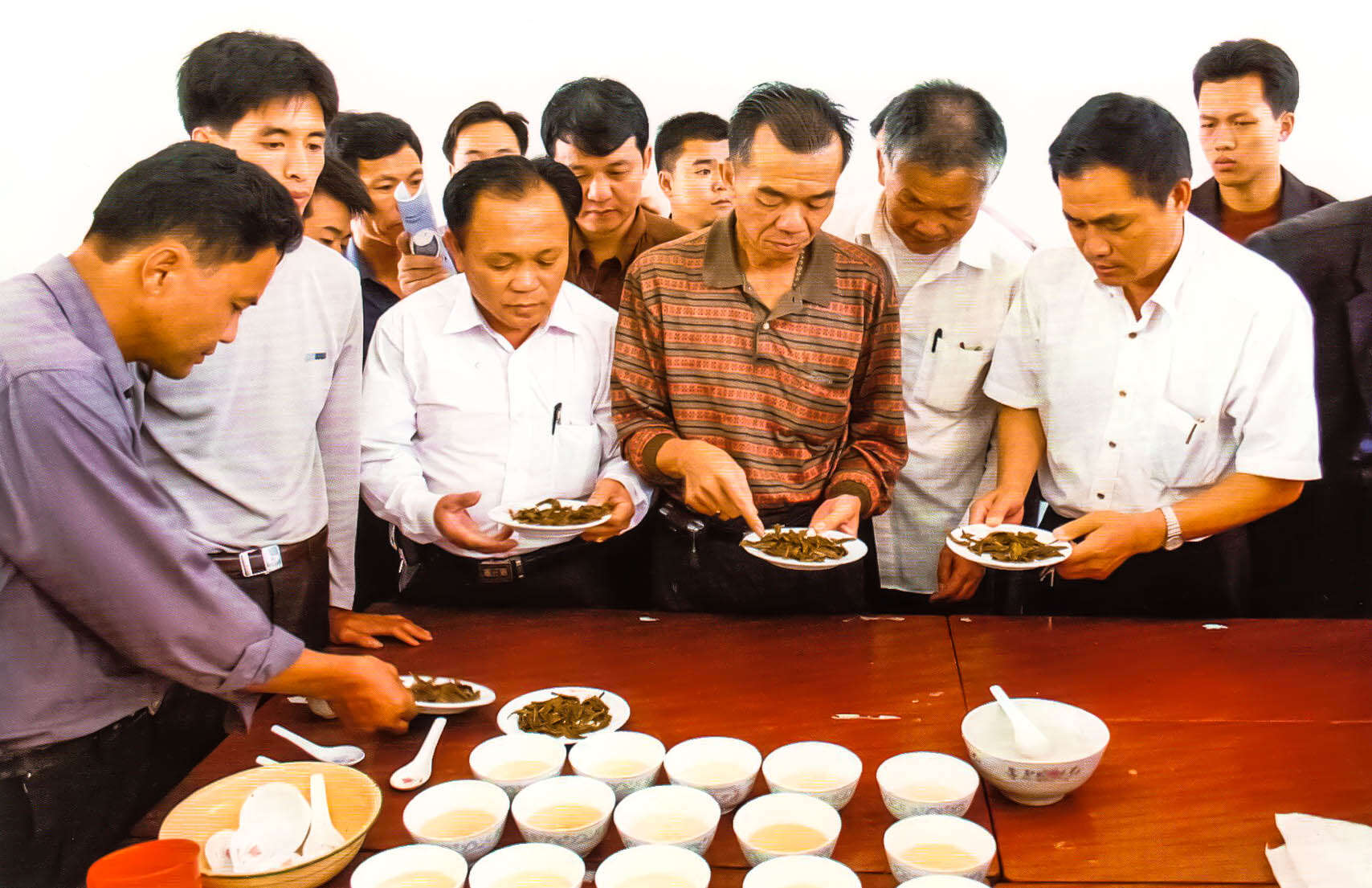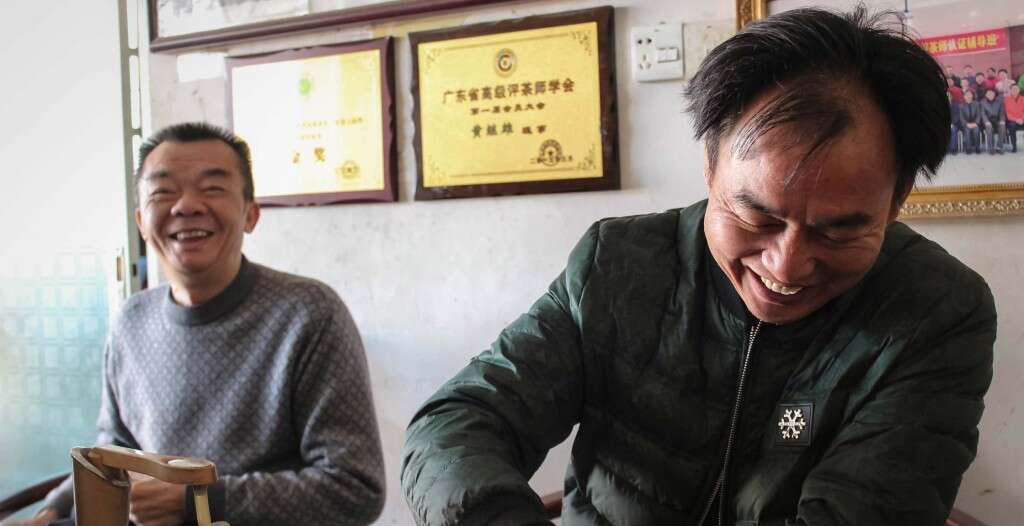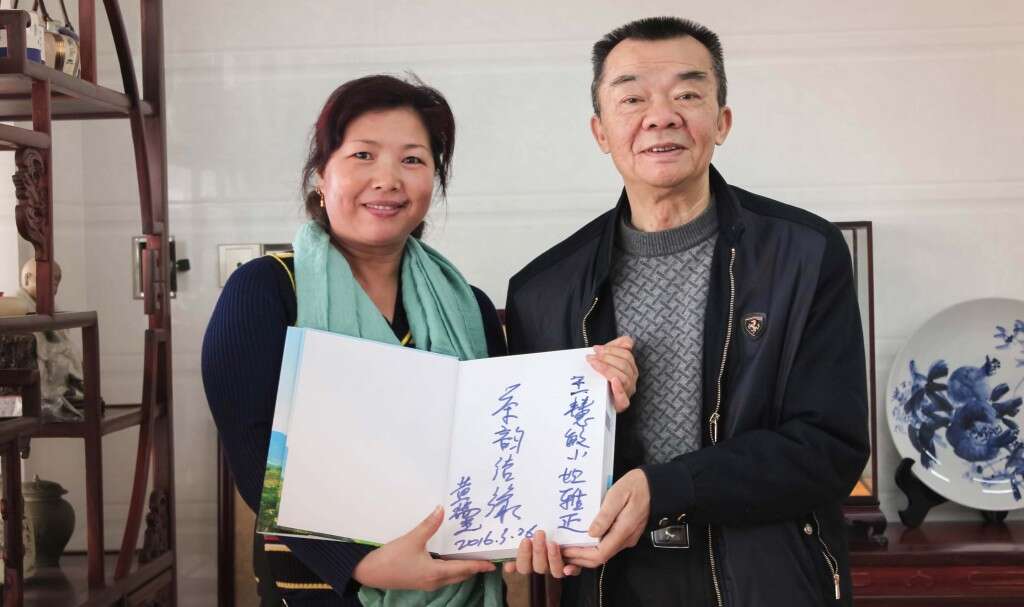Huang Rui Guang was born in Yang Mei village of Feng Huang in 1946. An accomplished technical master of tea, he is affectionately called a ‘modern tea sage’ by many. Huang Rui Guang likes to say that one love is enough in life, and his is tea. This excerpt is an attempt to portray a small piece of one man’s contributions to and love of tea.
This excerpted biography was translated from both The Story of Chinese Fenghuang Tea (Qiu Taorui, ed., Shenzhen Press Group Publishing House, 2015) and a 2015 featured biography in Gaungzhou’s Nanfang Media Group’s Southcn.com.
“One love is enough in life,
and mine is tea.”
– Huang Rui Guang
“Huang Ruiguang was born into a world of tea.
Many people don’t realize that Yangmei Village, nestled in a valley among the Fenghuang mountains, actually has a very short history in tea. Huang Ruiguang’s ancestors are actually from Da An Village, the ancestral origin of all Fenghuang tea. Huang Reiguang’s forefathers all lived for tea on their family’s mountaintop plot. His great grandfather descended the mountain to the Yangmei Village valley to plant crops for eating. In the spring, he picked tea in Da An, finished the tea, and then after the busy season, came down the mountain to tend his crops. This continued through Huang Ruiguang’s grandfather and father’s generation.
Huang Rui Guang’s son guides us through the old growth tea trees behind his ancestral home.
old growth tea trees at Huang Rui Guang’s ancestral home in Da An.
 This beautiful temple is next to Huang Rui Guang's ancestral home in Da An.
This beautiful temple is next to Huang Rui Guang's ancestral home in Da An.When socialism came to China, Wudong Shan’s tea fields were collectivized. At this time, Huang Ruiguang’s father was the top gader and assesor at the Fenghuang tea purchasing station. He had ample experience in tasting and judging tea. Huang Ruiguang’s childhood instilled in him a true commitment to tea.
In 1963, after Huang Ruiguang graduated from Feng Huang Middle School, he participated in setting up the local People’s Army tea plantation. From 1964 to 1968, Huang Ruiguang was sponsored to go to the Chao An Communist Vocational College to study tea agriculture. From 1970 to 1972, he was again sponsored by the commune to go to the Chaozhou Fengyang School of Agriculture to research tea farming. This research was the basis to Huang Ruiguang’s theories and lifetime contributions to the tea industry.
After his studies, Huang Ruiguang returned to his village. In 1974, Huang Ruigunag was chosen to lead the village production team.
Huang Ruiguang remembers two events from his time with the production team. The first was developing tea.
Yangmei Village is situated in the Fenghuang basin, and was confined by very old traditional ways of thinking. [At that time] the villagers didn’t believe that it was possible to grow tea. The full annual output of the region was 120 kilos of tea. The collective economy was considered backwards. People didn’t think anything of developing tea further in the region.
Huang Ruiguang didn’t let this stop him. Using his knowledge and research, he started by converting a third of a mu of rice paddy field to tea, introducing tea varietals and slowly developing the land. From the beginning, Huang Ruiguang always had his own way of doing things. During the collective era, all land was communal. Huang Ruiguang planted the communal fields, but assigned each small section to individual members to watch over. He allowed members to plant food crops between rows of tea for themselves. After one year, he took back central management of the land. In the second year, he developed another plot of land into tea fields. The benefit of this method was that the collective didn’t need to invest in centrally managing the newly planted fields, and each farmer could see a personal gain through cultivating their own vegetables.
It was a win-win situation. Tea developed without burdening the local economy this way. Huang Ruiguang was able to achieve a 400 kilo per mu yield annually, the highest yield in all of Fenghuang.
In this way, their production team was able to harvest 900 kilos of tea in the spring. The local economy flourished under his team. Huang Ruiguang hadn’t predicted that his methods would pioneer a whole new way to bring tea to Fenghuang as a whole. The local government brought his techniques to all of Fenghuang, spurring a period of growth for tea throughout the region.
The second piece of his time with the production team was the benefit to his hometown.
At the time, Yangmei Village was cut off by a river, making communication and exchange difficult. Huang Ruiguang reached out to everyone he knew and set his mind to solving the problem, and within a single year built, a bridge bringing roads to the village, along with electricity. He was able to do what generations in his village had only dreamed of. This brought huge change and great improvement to everyone’s lives.
 View from the peak of Wudong Shan
View from the peak of Wudong ShanDancong tea fields, 2016
Mi Lan Xiang Dancong tea fields, Spring 2016
Huang Ruiguang is called a modern day tea sage because of his lifetime of cultivation in the skills of planting, processing and tasting tea. By age 20, Huang Ruiguang had already made a name for himself in the production team. He was invited to Laojunliu Village to teach farmers how to make good tea.
” 凤凰单丛茶制作,讲究“天、地、人”的融汇” – making Fenghuang Dancong is all about the intersection of heaven, earth, and man. If the heavens bring fine weather and earth great soil, people should make great tea. Huang Ruiguang says this goes without saying. The place where he goes beyond others is in insisting that – regardless of the raw materials, no matter the weather – by relying on scientific practice and by relying on the craft of processing, strict analysis, and readjustment of technique and process to suit the place, a ‘most perfect’ harvest can be achieved.
In 1982, Huang Ruiguang’s tea won top tea in the country at the Hunan Changsha Conference and Competition. His unprecedented score of 99.8 was the highest rated tea in all of China.
 file photo, courtesy of 中国凤凰茶:茶史茶事茶人
file photo, courtesy of 中国凤凰茶:茶史茶事茶人Superb skill and rich experience brought Huang Ruiguang the mastery for this accomplishment. He was more than up to becoming a great judge of tea quality. He is admired for his ability to appraise a tea simply by looking at the color and appearance of the leaf. With one smell and one sip of a tea, he can tell you exactly where a tea grew, what conditions it experienced and the quality or shortcomings of the craft used to process the tea. From examining the leaves, he is able to make recommendations to farmer sand craftsmen to improve their processes. His tasting ability has brought him respect in the tea community across the country, and even an influence in tea across the world at large. In 1993, a Japanese tea master, Master Denno, came to China to study under Huang Ruiguang. After deep study and training, Master Denno proclaimed Huang Ruiguang a true tea master. Huang Ruiguang’s work in education and his skill have earned him the title of modern tea sage.
“爱就爱够” is Huang Ruiguang’s saying, an accurate description of his life in tea. Roughly translated, if you truly love something, you must be sure to do it well. He has inherited and carried forward the craft of Fenghuang Dancong.
In 2012, he was conferred the title of a recognized Cultural Treasure, and the true ‘heir’ to the craft of Dancong production by the city govenrment of Chaozhou.
Today, Huang Ruiguang has his own 30 mu tea fields. He truly deserves the title of cultural heir to Dancong. With his lifetime experience in cultivating the craft of tea and the skill of tasting, he is working to pass on to his two sons Wei Ming and Zhen Ming – both of whom have won top national ranks as technical masters, and have attained high levels of tasting and production skill.
In his retirement, Huang Ruiguang is running a tea shop. His seats are filled with distinguished guests every day, tasting tea and discussing Cha Dao, and the development of the industry.
Huang Ruiguang says “Tea was my fate. I have been tied to it for life, and I offer it my life as tribute.”

Translated by David Duckler from The Story of Chinese Fenghuang Tea // <<中国凤凰茶 : 茶史茶事茶人>> (Qiu Taorui, ed, Shenzhen Press Group Publishing House, 2015) and a 2015 featured biography in Gaungzhou’s Nanfang Media Group’s Southcn.com.
Photos credit to Verdant Tea, except where noted.


 How To
How To Myths & Legends
Myths & Legends Travelogue
Travelogue Tasting Journal
Tasting Journal Talking Shop
Talking Shop Tea 101
Tea 101 Watch
Watch Teaware
Teaware News
News













Leave a Reply
Very interesting story and man. Thank you for sharing this.
Thank you, Charles! We are also looking forward to sharing more interviews and translations from Huang Ruiguang's most recent book over the next few months. We are so honored for the opportunity to share these teas - we can't wait to keep sharing the story of the people behind them as much as possible.
This is a wonderful story. It would be amazing to meet and watch someone like this at work. Truly inspiring.